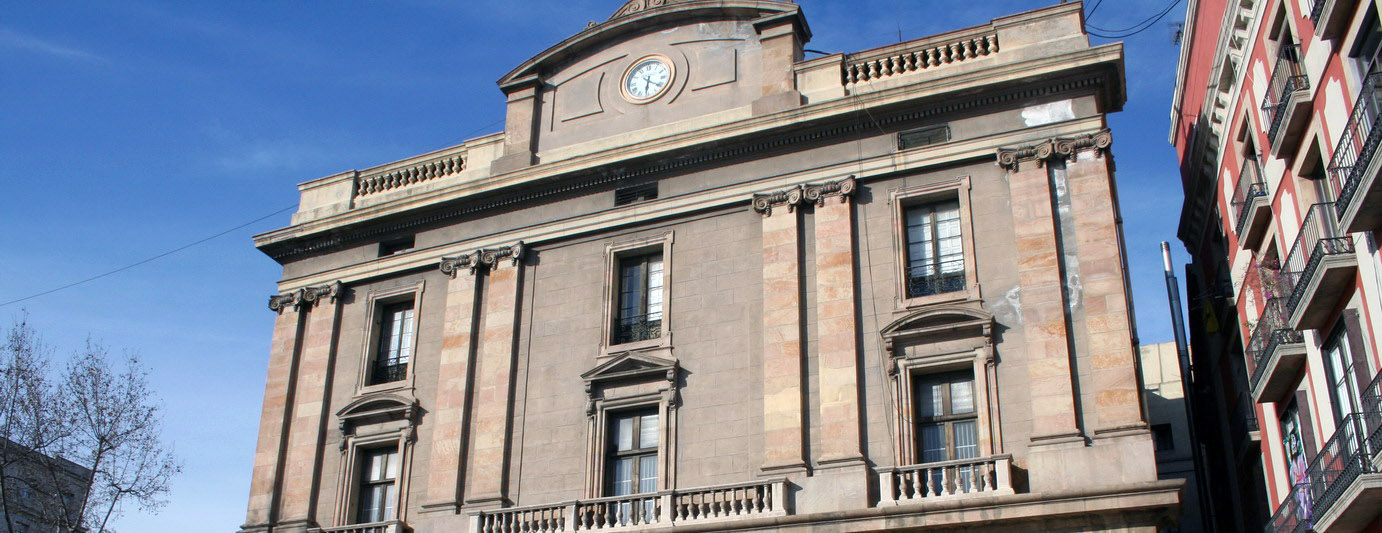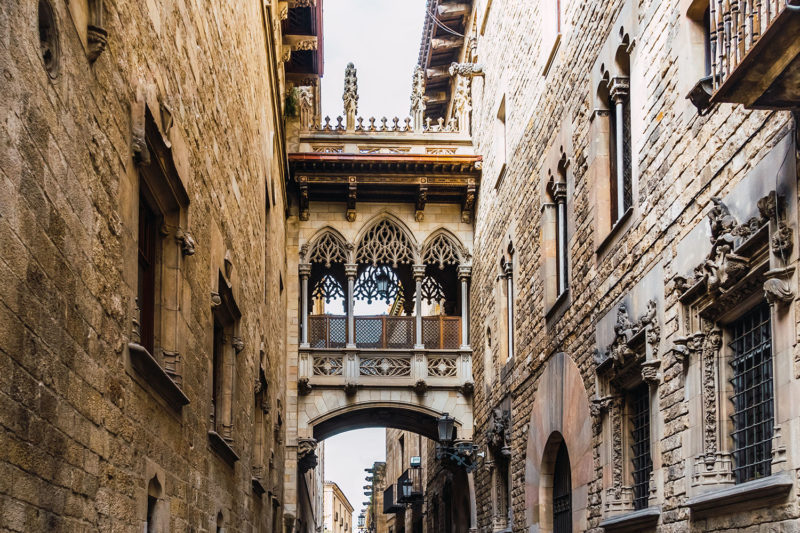

History of banking in Catalonia
The first modern banking society in Catalonia was founded in 1844. It was the Banc de Barcelona, which initially focused on financing businesses.
This bank stood out for being the first bank in the state to issue banknotes, as journalist Sergi Hernández explained on the betevé website. The journalist also emphasises the fact that the bank did not just focus on circulating banknotes throughout the state, given that at that time banknote issuance was delocalised, but was also the first to help trade and industry.
The bank’s first banknotes were entirely handmade. To prevent them from being counterfeited, they were made with many cylinder mold watermarks and were clipped into a checkbook. Drawings were also an important security point for their difficult reproduction, making them less likely to be counterfeited. Hernández also reminds us that there were two female figures on some banknotes of this period: one female figure represented Spain, and the other represented Barcelona, as a symbol of the bank’s mothers.
On the banknotes, one female figure represented Spain, and the other Barcelona, as a symbol of the bank’s mothers.
The journalist reminds us that the Banc de Barcelona, in its early days, ran smoothly until it suffered its first crises. Specifically, in 1874 it stopped issuing banknotes for the provincial banks, which meant that it ceased to operate as a commercial bank. Subsequently, under the effects of the crisis in Spain after the First World War, the Banco de Barcelona went bankrupt in 1920.
And the same year that it went bankrupt, the Banc de Catalunya was born in Reus. This bank holding company was created by the local financiers Fransesc and Eduard Recasens, and Evarist Fàbregas, as Marc Pons writes in El Nacional. These three people, owners of different banks in our country, took the remains of the Banco de Barcelona and added them to their new bank, called Banc de Catalunya. Pons also reminds us that the bank began to grow and open branches around Catalonia and even in the Valencian Country, and in 1930 it went international with the opening of a branch in Paris. But the history of this new bank was short. As the journalist Marc Pons wrote in his article in El Nacional, on 2 July 1931, Minister Prieto ordered the withdrawal of the balances held by Campsa and Cepsa in the Banc de Catalunya, which represented more than 50% of the bank’s deposits. Individuals and businesses also withdrew their deposits, and this led to the collapse of the Banc de Catalunya a few days later. And with the bankruptcy and the Bank of Spain refusing to finance the Banc de Catalunya, it became impossible to meet the obligations arising from the activity of Campsa and Cepsa. Thus, in 1931 it had to close its doors.
With the Banc of Catalunya bankrupt, and the Bank of Spain refusing to finance the Banco de Cataluña, the Banco de Cataluña finally went bankrupt in 1931.
Today, in the Catalan Countries, two building societies still operate, those known as Caixa d’Ontinyent and Caixa d’Estalvis de Pollença. There are also different credit cooperatives, such as the Caixa d’Enginyers and Caixa de Guissona. In addition, we have a dozen banks, an electronic money institution, different securities brokers, management companies of collective investment institutions and cooperative societies with financial services according to the data of the list of financial entities of the Catalan countries.
But we are at a time of change in society, the pandemic has accelerated what was already happening more gradually, which is the need to reinvent the way we live, to be more ethical and more sustainable. This has created the need for a bank of the future, a bank that adapts to all generations, with a clear response, that is transparent and where its clients are treated as people, attending to their real needs with transparency and in a simple way. We are leaving traditional banking behind. Without detracting from a history of banks and building societies that have influenced and left their mark on the Catalan economy, it is now time to reinvent ourselves, to roll up our sleeves and “good sickle blow” as we Catalans say, cultivate the land to give birth to the new banking system that the country needs.
11Onze is the community fintech of Catalonia. Open an account by downloading the super app El Canut for Android or iOS and join the revolution!






Gràcies per arremangar-vos, equip 11Onze!!
Gràcies a tu, Mercè, per ser-hi i per seguir-nos!!!
Gran història de catalunya que desconeixia!
Celebrem que t’hagi agradat, Jordi, i moltes gràcies pel teu comentari!!!
I del banc dels Pirineus, crec que a Olot, explicareu alguna cosa?
Jo ni en tinc constància ni el conec, no sé pas la resta… Moltes gràcies pel teu comentari, Pere!!!
Sabeu que “La Caixa” anteriorment Caixa de Pensions i Montse de Pietat de Barcelona, va ser fundada (1904) per dues entitats centenàries de la Societat Civil Catalana? El Centre Excursionista de Catalunya (1876) i el Institut Agrícola Català de Sant Isidro (1851)
Fet pel qual el president electe del CEC, seguia essent membre del Consell General de La Caixa.
Cada dia aprenem coses noves. Gràcies pel teu comentari Anna, ens veiem per La Plaça
Tenim un passat amb experiència. EL ministre Prieto ordenant retirar els dipòsits de Cepsa i Campsa del banc de Catalunya i negant-se a rescatar-lo.
I tenim futur amb 11onze, amb una gran visió de futur. Gràcies
Gràcies a tu pel teu comentari Mercè, ens veiem per La Plaça
A Catalunya, seguim impulsant solucions financeres avançades: El Canut. M’ha agradat molt l’article
Gràcies Francesc pel teu comentari, seguim endavant!
Molt bo
Gràcies, Josep!!!
Ampliant coneixement, interessant, gràcies.
Gràcies Miquel, seguim endavant!
Molt instructiu!.
Celebrem que li trobis, Pere, i moltes gràcies pel teu comentari!!!
gran frase mireia!
Gràcies pel comentari Manel, ens veiem per La Plaça
Ok, Seguim
Gràcies, Josep.
Gràcies, Joan! Ens veiem per La Plaça!
sempre descobreixes en la historia quelcom que te fil de continuïtat en el present
gra`cies
Per això, Alícia, hem de conèixer la història. Per a aprendre’n i extreure’n el que és bo, i deixar enrere el que és dolent. Seguim!
Jo hagués parlat també de la Taula de Canvi, un revolució dins la banca pública a nivell Europeu i precursor de la banca.
Moltes gràcies per la recomanació Josep! Realment la Taula de Canvi és un fet diferencial i innovador de la banca catalana de l’edat mitjana. Mirarem de dedicar-li un article!
M’ha agradat molt, gràcies!
Molt interessant! Sempre és bo saber coses i saber d’on venim
Conèixer el passat de la banca a Catalunya, et fa ser més conscient de l’importancia d’un banc com 11Onze
Exacte, saber d’on venim per determinar cap on anirem. Gràcies, Alicia!
Ens alegra que t’agradi, Lau!